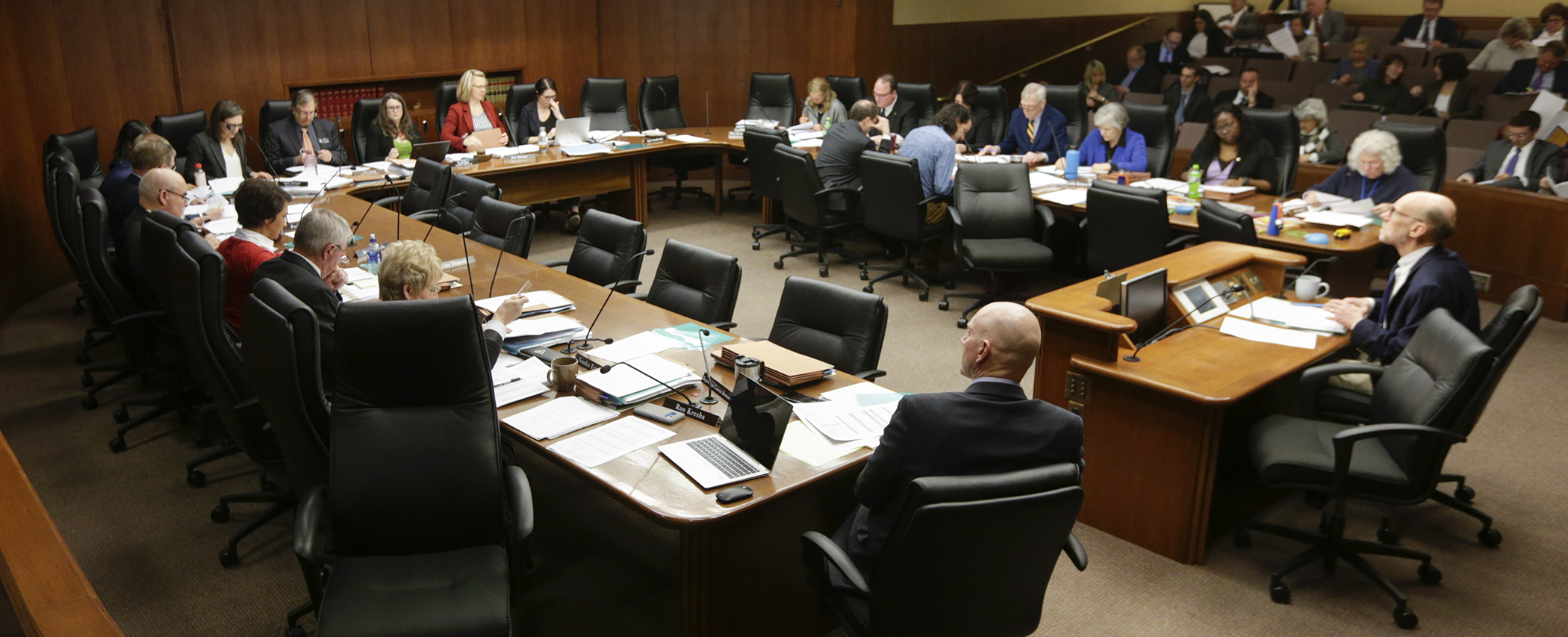Omnibus education finance bill proposes $900 million in added investments

Prioritizing additional investments in general education basic revenue and special education funding, the House Education Finance Division began hearings on its omnibus education funding bill Monday.
Chair of the division, Rep. Jim Davnie (DFL-Mpls) sponsors HF2400, which was amended and tabled for further discussion. Additional testimony is scheduled for Tuesday, with amendments and action scheduled for Thursday.
The proposal would increase education spending by $900 million during the 2020-21 biennium over the base budget, with the largest investment, $521 million, used to increase the general education basic formula by 3 percent in Fiscal Year 2020 and 2 percent in Fiscal Year 2021.
Another significant investment, $118 million, would be appropriated to increase special education aid, remove the aid growth cap, add cross-subsidy reduction aid and reduce the portion of unreimbursed special education costs. Similarly, policy provisions would aim to reduce the amount of paperwork required of special education instructors.
The proposed funding increases received strong support from school board and administration representatives, including Brad Lundell, executive director of Equity in Education, who testified in support of the widespread investments.
“I can’t think of a dollar that’s in the bill that’s misspent,” Lundell said. “I think you’ve done a very good job at looking at a broad range of needs and coming forward with a very comprehensive look.”
Licensure system changes
Several policy provisions were picked up from the House Education Policy Committee’s omnibus E-12 bill, HF1711, including highly regarded provisions geared toward increasing the percentage of teachers of color, as well as controversial provisions that would change the state’s teacher licensure system.
The licensure changes would limit the number of times an educator could renew a Tier 1 and Tier 2 license, and it would prohibit them from teaching the same students more than one year. The provisions would require teachers to receive professional development in order to obtain advanced licensure, which proponents say will ensure they’re better prepared to teach students.
Given the recent rollout of the current system, critics, including Gary Amoroso, executive director of Minnesota Association of School Administrators, say the changes would be premature and could deter effective individuals from entering the profession.
“The tiered licensure piece, we really wish that would be given a chance to grow and develop,” Amoroso said. “We’ve not even been in it for a year yet and would like to see that continue to move forward without the changes.”
Other notable increased appropriations for the 2020-21 biennium include:
- $47 million to maintain the existing number of voluntary pre-Kindergarten seats;
- $24 million for safe schools aid;
- $16 million for early learning scholarships;
- $15 million for full-service community schools;
- $7.6 million for the Regional Public Library system and modify the distribution formula for the funds among the 12 regional library systems;
- $4.5 million in English language basic revenue;
- $4.3 million for the Breakfast After the Bell program;
- $3.8 million for adult basic education aid; and
- $3 million to recruit and retain teachers of color.
Other notable policy provisions would:
- authorize a school board to renew a previously approved, unchanged referendum, following public testimony; including a process to revoke board approved referendum authority;
- allow school districts to start school before Labor Day for two years, on Aug. 31, 2020 and Aug. 30, 2021;
- establish a working group to review transportation and bussing costs, identify efficiencies and recommend policy and formula changes;
- require a school district to screen for characteristics of dyslexia in all students identified as not reading at grade level by the end of kindergarten, grade 1 and grade 2;
- require school districts to include non-exclusionary disciplinary policies and practices;
- allow adult basic educators and early childhood educators to participate in continuing contracts; and
- require districts that participate in the national school lunch program to adopt a meals policy and provide meals in a respectful manner.
The following are selected bills that have been incorporated in part or in whole into the omnibus education finance bill:
- HF55 (Jurgens)
- HF116 (Freiberg)
- HF125 (Bennett)
- HF448 (Her)
- HF508 (Haley)
- HF824 (Kunesh-Podein)
- HF1037 (Edelson)
- HF1329 (Kunesh-Podein)
- HF1559 (Youakim)
- HF1711 (Youakim)
- HF2207 (Davnie)
- HF2610 (Pinto)
Related Articles
Search Session Daily
Advanced Search OptionsPriority Dailies
Ways and Means Committee OKs proposed $512 million supplemental budget on party-line vote
By Mike Cook Meeting more needs or fiscal irresponsibility is one way to sum up the differences among the two parties on a supplemental spending package a year after a $72 billion state budg...
Meeting more needs or fiscal irresponsibility is one way to sum up the differences among the two parties on a supplemental spending package a year after a $72 billion state budg...
Minnesota’s projected budget surplus balloons to $3.7 billion, but fiscal pressure still looms
By Rob Hubbard Just as Minnesota has experienced a warmer winter than usual, so has the state’s budget outlook warmed over the past few months.
On Thursday, Minnesota Management and Budget...
Just as Minnesota has experienced a warmer winter than usual, so has the state’s budget outlook warmed over the past few months.
On Thursday, Minnesota Management and Budget...